| Weight | 1 lbs |
|---|---|
| Dimensions | 9 × 5 × 2 in |
| host | mouse |
| isotype | IgG1 |
| clonality | monoclonal |
| concentration | 1 mg/mL |
| applications | ICC/IF, WB |
| reactivity | Heme Oxygenase-1 |
| available sizes | 100 µg |
mouse anti-Heme Oxygenase-1 monoclonal antibody (GTS-1) 2852
$509.00
Antibody summary
- Mouse monoclonal to Heme Oxygenase-1
- Suitable for: ELISA
- Isotype: IgG1
- 100 µg
mouse anti-Heme Oxygenase-1 monoclonal antibody (GTS-1) 2852
| antibody |
|---|
| Tested applications ELISA |
| Recommended dilutions Immunoblotting: use at 5-10ug/mL. A band of ~33kDa is detected. Immunohistochemistry: use at 5-10ug/mL on human frozen or paraffin-embedded tissue. Antigen retrieval with 0.4ug/mL Proteinase K. These are recommended concentrations. Endusers should determine optimal concentra |
| Immunogen Microsomal fraction of transformed mouse T-cell transfected with rat heme oxygenase- 1 (WR19LrHO-1). |
| Size and concentration 100µg and |
| Form lyophilized |
| Storage Instructions Stock solution of 2mg/ml should be stored for one (1) year at -20°C in appropriate aliquots to avoid multiple freeze-thaw cycles or at 4°C for 6 months with the addition of 0.1% sodium a |
| Storage buffer PBS, pH 7.4, 1% BSA., lyophilized. |
| Purity immunogen affinity purification |
| Clonality monoclonal |
| Isotype IgG1 |
| Compatible secondaries goat anti-mouse IgG, H&L chain specific, peroxidase conjugated polyclonal antibody 5486 goat anti-mouse IgG, H&L chain specific, biotin conjugated, Conjugate polyclonal antibody 2685 goat anti-mouse IgG, H&L chain specific, FITC conjugated polyclonal antibody 7854 goat anti-mouse IgG, H&L chain specific, peroxidase conjugated polyclonal antibody, crossabsorbed 1706 goat anti-mouse IgG, H&L chain specific, biotin conjugated polyclonal antibody, crossabsorbed 1716 goat anti-mouse IgG, H&L chain specific, FITC conjugated polyclonal antibody, crossabsorbed 1721 |
| Isotype control Mouse monocolonal IgG1 - Isotype Control |
| target relevance |
|---|
| Protein names Heme oxygenase 1 (HO-1) (EC 1.14.14.18) [Cleaved into: Heme oxygenase 1 soluble form] |
| Gene names HMOX1,HMOX1 HO HO1 |
| Protein family Heme oxygenase family |
| Mass 32819Da |
| Function FUNCTION: [Heme oxygenase 1]: Catalyzes the oxidative cleavage of heme at the alpha-methene bridge carbon, released as carbon monoxide (CO), to generate biliverdin IXalpha, while releasing the central heme iron chelate as ferrous iron (PubMed:11121422, PubMed:19556236, PubMed:7703255). Affords protection against programmed cell death and this cytoprotective effect relies on its ability to catabolize free heme and prevent it from sensitizing cells to undergo apoptosis (PubMed:20055707). {ECO:0000269|PubMed:11121422, ECO:0000269|PubMed:19556236, ECO:0000269|PubMed:7703255, ECO:0000303|PubMed:20055707}.; FUNCTION: [Heme oxygenase 1]: (Microbial infection) During SARS-COV-2 infection, promotes SARS-CoV-2 ORF3A-mediated autophagy but is unlikely to be required for ORF3A-mediated induction of reticulophagy. {ECO:0000269|PubMed:35239449}.; FUNCTION: [Heme oxygenase 1 soluble form]: Catalyzes the oxidative cleavage of heme at the alpha-methene bridge carbon, released as carbon monoxide (CO), to generate biliverdin IXalpha, while releasing the central heme iron chelate as ferrous iron. {ECO:0000269|PubMed:7703255}. |
| Catalytic activity CATALYTIC ACTIVITY: Reaction=heme b + 3 reduced [NADPH--hemoprotein reductase] + 3 O2 = biliverdin IXalpha + CO + Fe(2+) + 3 oxidized [NADPH--hemoprotein reductase] + 3 H2O + H(+); Xref=Rhea:RHEA:21764, Rhea:RHEA-COMP:11964, Rhea:RHEA-COMP:11965, ChEBI:CHEBI:15377, ChEBI:CHEBI:15378, ChEBI:CHEBI:15379, ChEBI:CHEBI:17245, ChEBI:CHEBI:29033, ChEBI:CHEBI:57618, ChEBI:CHEBI:57991, ChEBI:CHEBI:58210, ChEBI:CHEBI:60344; EC=1.14.14.18; Evidence={ECO:0000269|PubMed:11121422, ECO:0000269|PubMed:19556236, ECO:0000269|PubMed:7703255}; PhysiologicalDirection=left-to-right; Xref=Rhea:RHEA:21765; Evidence={ECO:0000305|PubMed:7703255}; |
| Subellular location SUBCELLULAR LOCATION: Endoplasmic reticulum membrane {ECO:0000269|PubMed:19556236, ECO:0000269|PubMed:22419571, ECO:0000269|PubMed:27184847}; Single-pass type IV membrane protein {ECO:0000255}; Cytoplasmic side {ECO:0000269|PubMed:22419571}. |
| Tissues TISSUE SPECIFICITY: Expressed at higher levels in renal cancer tissue than in normal tissue (at protein level). {ECO:0000269|PubMed:20855888}. |
| Structure SUBUNIT: (Microbial infection) Interacts with SARS-CoV-2 ORF3A protein; the interaction promotes ORF3A-induced autophagy but is unlikely to be involved in ORF3A-mediated induction of reticulophagy. {ECO:0000269|PubMed:35239449}.; SUBUNIT: Homodimer and higher order homooligomer (PubMed:19556236). Oligomerization is crucial for its stability and function in the endoplasmic reticulum (PubMed:19556236). Interacts with FLVCR2; this interaction is potentiated in the presence of heme. {ECO:0000250|UniProtKB:P14901, ECO:0000269|PubMed:19556236}. |
| Post-translational modification PTM: A soluble form arises by proteolytic removal of the membrane anchor. {ECO:0000305|PubMed:7703255}. |
| Domain DOMAIN: The transmembrane domain is necessary for its oligomerization. {ECO:0000269|PubMed:19556236}. |
| Involvement in disease DISEASE: Heme oxygenase 1 deficiency (HMOX1D) [MIM:614034]: A disease characterized by impaired stress hematopoiesis, resulting in marked erythrocyte fragmentation and intravascular hemolysis, coagulation abnormalities, endothelial damage, and iron deposition in renal and hepatic tissues. Clinical features include persistent hemolytic anemia, asplenia, nephritis, generalized erythematous rash, growth retardation and hepatomegaly. {ECO:0000269|PubMed:9884342}. Note=The disease is caused by variants affecting the gene represented in this entry. |
| Target Relevance information above includes information from UniProt accession: P09601 |
| The UniProt Consortium |
Data
Publications
| pmid | title | authors | citation |
|---|---|---|---|
| We haven't added any publications to our database yet. | |||
Protocols
| relevant to this product |
|---|
| ELISA |
Documents
| # | SDS | Certificate | |
|---|---|---|---|
| Please enter your product and batch number here to retrieve product datasheet, SDS, and QC information. | |||
Only logged in customers who have purchased this product may leave a review.
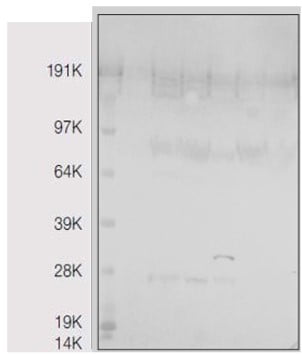
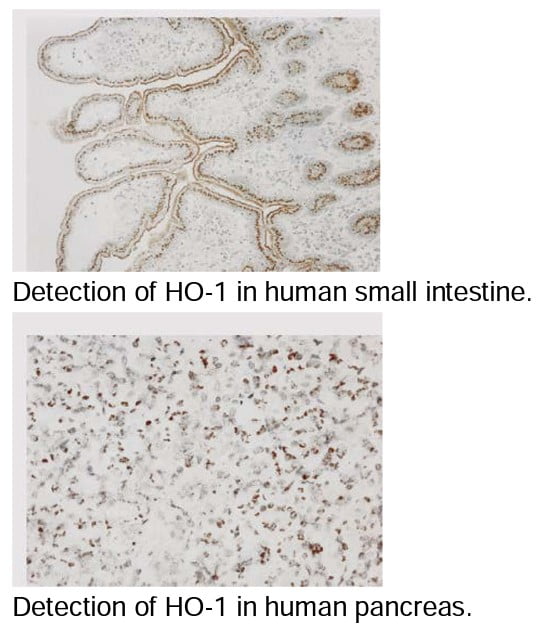
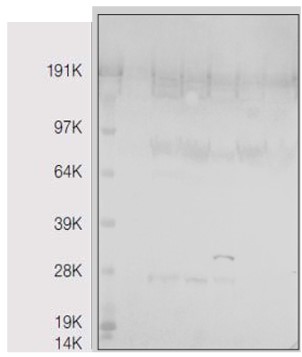
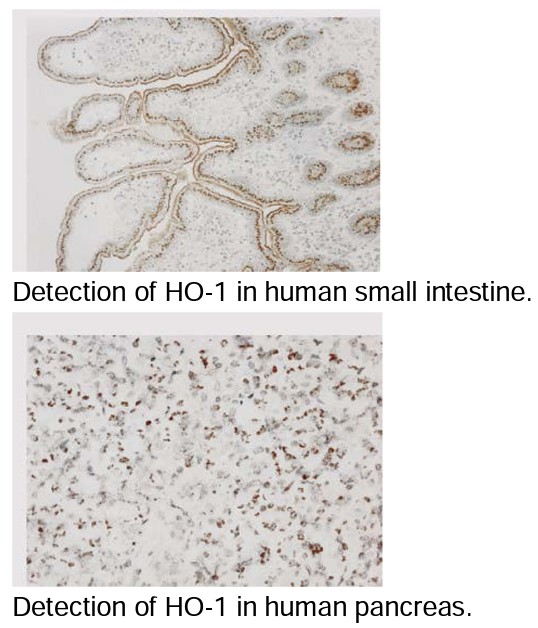
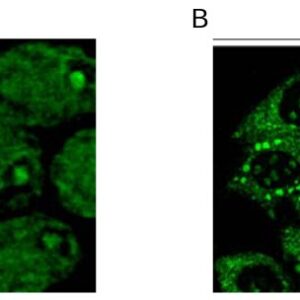
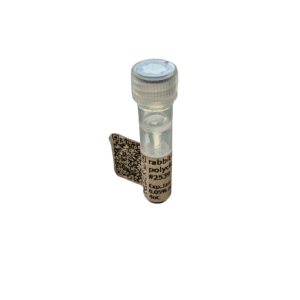
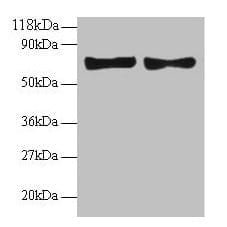
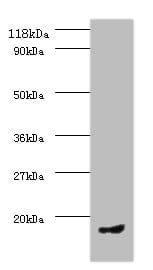

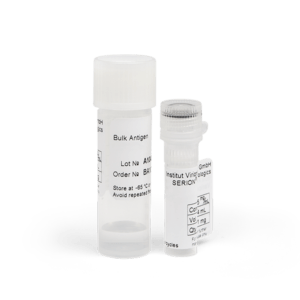
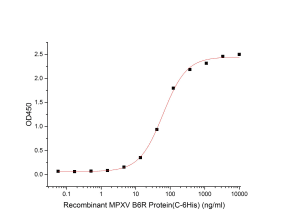
Reviews
There are no reviews yet.